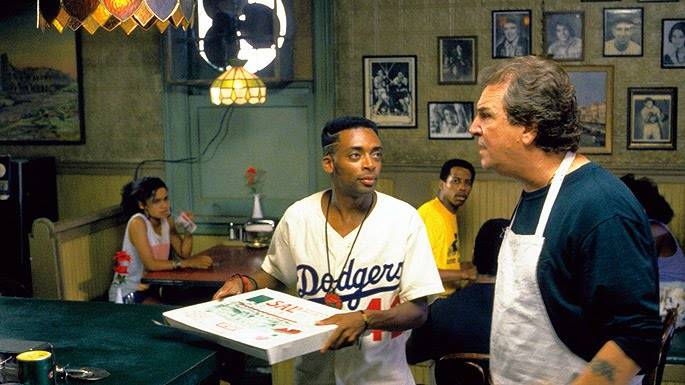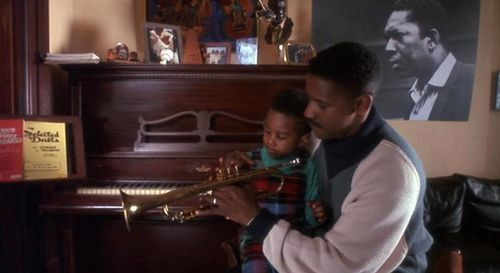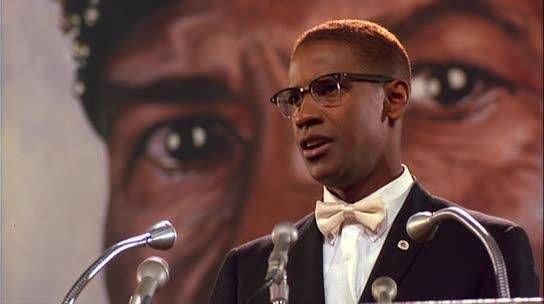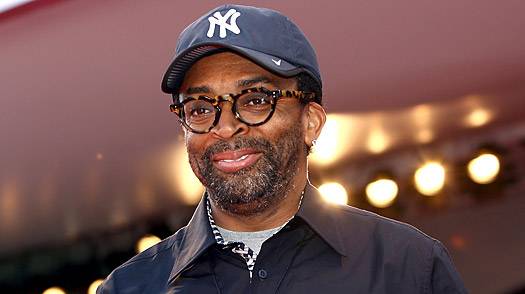After I returned from my tour of America in 1991 I took a job working in a retail Video shop and this presented me, as an avid movie fan, with two key benefits; the first was the opportunity to preview any tape outside of opening hours, the second was the generous staff discount that allowed me to grow my own film collection. It was at this time that I discovered the work of Spike Lee, starting with his debut feature She’s Gotta Have It for which he was dubiously dubbed “the black Woody Allen” by some for the use of monochrome cinematography in a New York setting and his credits as writer, director and actor in the role of Michael Jordan obsessed, Mars Blackmon, which he reprised for a series of adverts he made for Nike also featuring the basketball star.
His second film, School Daze, produced by David Putnam, was a confusing blend of Animal House style fraternity comedy, equal parts Hollywood musical and biting satire on the notion of black identity in modern America. However, it was his next film Do The Right Thing that really put Lee on the map, taking place on the hottest day of the year in Brooklyn’s Bed-Stuy neighbourhood, it focuses on the mounting racial tension between the white family inhabitants of Sal’s Famous Pizzeria and it’s predominate black clientele, headed up by Buggin’ Out (Giancarlo Esposito) who insists that Sal (Danny Aiello) gets some brothers up on the wall, instead of the “Wall of Fame” consisting entirely of famous Italian-Americans, or they will boycott his restaurant.
Lee plays Sal’s delivery boy, Mookie, who is trying to balance his life as a young father, his relationship and the perceived conflict of working for a white boss by his friends. The animosity reaches a peak at the end of the day when Sal destroys regular customer, Radio Raheem’s (Bill Nunn) boombox leading to a riot, in the ensuing violence the police throttle Raheem to death whilst trying to arrest him, to dispel the vengeful crowd Mookie throws a garbage can through the pizzeria’s window resulting in it being razed to the ground. This action is deliberately ambiguous, the audience are left pondering whether Mookie did the right thing and I’ve found my own response to this can change with each viewing.
The next Spike Lee Joint was Mo’ Better Blues his valentine to the Jazz music of his father, Bill Lee, starring Denzel Washington as the trumpeter and band leader, Bleek Gilliam, who we see as young boy in the opening shots of the film practising scales religiously whilst his friends wait for him to come out to play. The movie cleverly explores the life of an artist having to choose between two muses, one a glamorous and ambitious singer, Clarke (Cynda Williams), the other a teacher, down to earth and maternal, Indigo (Joie Lee), yet ultimately it’s his music that he is wedded to. It also depicts the struggle of egos within a band when saxophonist, Shadow Henderson (Wesley Snipes) vies with Bleek for leadership, the etiquette of solos versus grandstanding, and having to deal with an ineffective, gambling, manager, Giant (Spike Lee), who happens to be your best friend.
The film is heavily stylised and Lee’s regular cinematographer, Ernest Dickerson, provides a rich, saturated colour palette giving the musical sequences at the Underdog Club almost a cartoon look and feel. The score, composed by Bill Lee, is performed by the Branford Marsalis quarter, featuring Terrance Blanchard on trumpet and it remains one of my most listened to soundtrack albums. Ultimately, Giant’s gambling debts catch up with him and Bleek sacrifices his music for their friendship, Shadow takes over both as Clarke’s lover and leader of the band; fate forces Bleek to choose Indigo to save his life and in the long montage featured in the last reel, synchronised to John Coltrane’s Love Supreme, they settle down, get married and have a son, Miles, who also learns the trumpet and so we have come full circle.
Possibly my favourite Spike Lee film is 1992’s Malcolm X, in this movie he displays an encyclopaedic knowledge of the Cinema providing references from a myriad of influences including the D. W. Griffith silent classic Birth Of A Nation, Billy Wilder’s film noir Ace In The Hole, Vincente Minnelli’s musical The Band Wagon, Francis Ford Coppola’s The Godfather, Martin Scorsese’s Goodfellas and countless other movies; it is truly astounding how many visual treats he is able to cram in to what so easily could have been a standard, po-faced, biopic.
Denzel Washington excels in the title role and is on screen almost constantly for the film’s epic 3½ hour running time. Befitting the Herculian directorial task Lee takes a smaller acting role as Shorty, Malcolm’s barbershop buddy who first straightens his hair and then runs with his gang on a petty crime spree that leads to a lengthy prison sentence. Whilst inside Malcolm is exposed to the teachings Elijah Muhammad, the leader of the Nation of Islam and converts to the Muslim faith taking the name Malik Shabazz.
The early part of the film owes its look and style to Mo’ Better Blues with Malcolm and Shorty running around in Zoot suits, it has a lot of lighter comic moments which perfectly balance the tone of the second half of the film which is preoccupied with the false promises, corruption and separatism that beleaguers the Nation of Islam and its leadership, culminating with Malcolm X’s assassination at the Aubadon Ball Room in 1965 and closing with Ossie Davis reading his original eulogy from his funeral. Spike Lee is not just a marginal, independent filmmaker but among the finest of his generation.







2 thoughts on “Spike Lee”
I look forward to hearing from you! Excellent blog by the way!
I remember seeing She’s Gotta Have It and once it was done with Spike’s message at the end I decided this was a director I was going to follow. Unfortunately, I wasn’t thrilled at all with the subject matter in his second film School Daze, so it turned me off him for a while. He’s had some big highs and some big lows since then. I actually wish he would try to do commercial films a little more often. Inside Man was a very good movie.
Comments are closed.